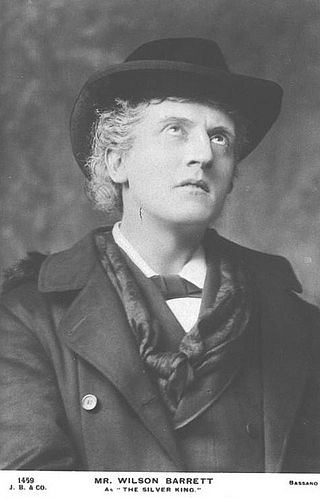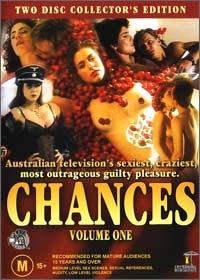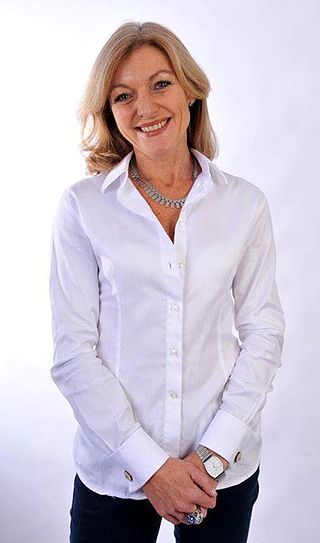Related Research Articles

Wilson Barrett was an English manager, actor, and playwright. With his company, Barrett is credited with attracting the largest crowds of English theatregoers ever because of his success with melodrama, an instance being his production of The Silver King (1882) at the Princess's Theatre of London. The historical tragedy The Sign of the Cross (1895) was Barrett's most successful play, both in England and in the United States.

Number 96 is an Australian primetime soap opera that aired on 0-10 Network from 13 March 1972 to 11 August 1977, originally broadcast in the primetime slot of 8:30 pm for 5 x half-hour episodes every weeknight, then later 2 x one hour episodes screened per week.

Cornelia Frances Zulver, OAM, credited professionally as Cornelia Frances, was an English-Australian actress. After starting her career in small cameos in films in her native England, she became best known for her acting career in Australia after emigrating there in the 1960s, particularly her iconic television soap opera roles with portrayals of nasty characters. she also worked on stage and in voice-over.

Carl Anthony Williams was an Australian convicted murderer and drug trafficker from Melbourne, Victoria. He was a central figure in the Melbourne gangland killings as well as their final victim.

School's Out is a Canadian drama television film based on the Degrassi teen drama franchise created by Linda Schuyler and Kit Hood in 1979. It was directed by Hood and written by Yan Moore, based on a story by Moore, Schuyler and Hood. It aired on CBC Television on January 5, 1992, and served as a finale to the series Degrassi High and its predecessor Degrassi Junior High, which are collectively known as the Degrassi Classic era of the franchise.
The Moran family is an infamous Melbourne, Australia-based criminal family notable for their involvement in the Melbourne gangland killings. Family matriarch Judy Moran lost two sons, Jason and Mark, estranged husband Lewis, and brother-in-law Des died in an underworld feud that resulted in the deaths of over 30 criminals from January 1998 to August 2010.

Chances is an Australian prime time soap opera which aired from 29 January 1991 to 30 December 1992 on Nine Network. The show was initially pitched by production company Beyond International, as a straightforward drama revolving around a middle-class family whose lives are transformed when they win $3 million in the lottery. However, the network requested raunchier, more erotic storylines in the vein of Number 96 and The Box, with contractually-obligated nudity and sex scenes. Later episodes diverged considerably from the show's original premise, with increasingly bizarre plots involving man-eating plants, devil worshippers and neo-Nazi cults.

The Australasian Post, commonly called the Aussie Post, was Australia's longest-running weekly picture magazine.
James Patrick Healey is an Irish-born Australian actor.
Nadia Tass is an Australian theatre director and film director and producer. She is known for the films Malcolm (1986) and The Big Steal (1990), as well as an extensive body of work in the theatre, both in Australia and internationally.

Tessa James is an Australian actress and model. She made her acting debut as Anne Baxter in soap opera Neighbours in 2006. James played the role of Nicole Franklin in Home and Away from 2008 until 2011. She has also appeared in Beaconsfield and Love Child.
All the Rivers Run is an Australian historical novel by Nancy Cato, first published in 1958.
Judith Maryanne Moran is the matriarch of the Moran criminal family of Melbourne, Victoria, Australia, involved in the Melbourne gangland killings.

Fiona Heather Patten is an Australian former politician. She was the leader of Reason Australia and was a member of the Victorian Legislative Council between 2014 and 2022, representing the Northern Metropolitan Region until she lost her seat at the 2022 state election.
Underbelly: A Tale of Two Cities, the second series of the Nine Network crime drama series Underbelly, originally aired from 9 February 2009 to 4 May 2009. It is a thirteen-part series loosely based on real events that stemmed from the marijuana trade centred on the New South Wales town of Griffith. The timeline of the series is the years between 1976 and 1987. Underbelly: A Tale of Two Cities primarily depicts the Mr. Asia drug syndicate and its influence on crime in Australia. Among the characters presented are real-life criminals Robert Trimbole, Terry Clark, George Freeman, Christopher Dale Flannery, Alphonse Gangitano and the Kane Brothers. The mini-series is a prequel to the 2008 production Underbelly, which was about the Melbourne gangland killings and forms part of the Underbelly series.

Nancy Sales Cash is an American novelist, journalist and television producer. A native of North Carolina, her career includes journalism, advertising and public relations, and television production in North Carolina, New York, London and Sydney.
Fay Kelton, is an Australian former actress radio, stage and television, she relocated to Melbourne in her teens. She was a regular performer on the ABC radio serial Blue Hills (1949-1976), and also appeared in the shorter serials for commercial radio Danse Macabre and Forests of the Night.
Ring of Scorpio is a 1990 Australian TV miniseries by Alan Bateman, Errol Sullivan and Kim Williams. It was made with assistance from the Film Finance Corporation Australia, BBC Television and the Nine Network. It was shot in Morocco, Spain, Sydney and Broken Hill.

Dynasty is an Australian TV series that aired from 7 October 1970 to 6 October 1971, based on the 1967 Tony Morphett novel of the same name which had been previously adapted as a television play.
References
- ↑ Ed. Scott Murray, Australia on the Small Screen 1970-1995, Oxford Uni Press, 1996 p195
- 1 2 3 Humphries, Scott (2023). The Age of Melodramatic Miniseries. Jefferson: McFarland & Company. pp. 150–164. ISBN 9781476691626.
- 1 2 Moran, Albert (1993). Moran's Guide to Australian TV Series. North Ryde: Australian Film, Television and Radio School. p. 180. ISBN 0642184623.
- ↑ Murphy, Nicola (28 July 1990). "James flares up!". TV Week. p. 25.
- ↑ Sadlier, Kevin (29 July 1990). "Fall Girl still living dangerously". The Sun Heald (Sydney). p. 21.
- ↑ Idato, Michael (1 August 1990). "Sex-cess of fatuous trash". Daily Telegraph (Sydney). p. 22.